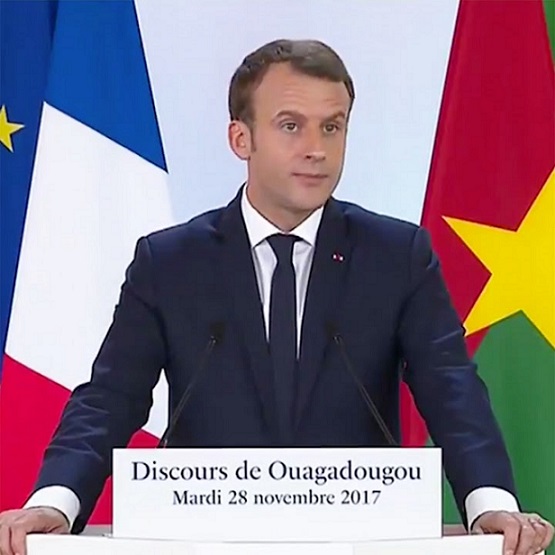French President Emmanuel Macron speaking on November 28 in Ouagadougou, Burkina Faso. (screenshot via @EmmanuelMacron/Twitter)
Last week during a speech in Ouagadougou, the capital of Burkina Faso, French President Emmanuel Macron called for the restitution of African artworks and artifacts currently held in France.
“I cannot accept that a large part of the cultural patrimony of several African countries is in France. There are historical explanations for this, but there is no valid, durable, or unconditional justification for it,” Macron said, according to Le Monde. “Africa’s patrimony must be celebrated in Paris but also in Dakar, Lagos, and Cotonou. This will be one of my priorities. In the next five years, I want the conditions to be created for the temporary or permanent restitution of African patrimony to Africa.”
Though it’s unclear what steps Macron will take to facilitate the restitution of African artifacts, his promise was met with cautious optimism. “I think this announcement is historic because it’s the president of the Republic who’s making it publicly, who’s saying it in his first big African speech, and saying it to the whole world,” Marie-Cecile Zinsou, the founder of the Zinsou Foundation in Cotonou, Benin, told RFI. “Obviously, president Macron cannot decide alone, but he can propose legislation on the subject. Objectively, he has a political majority. One can certainly imagine having an exceptional law on issues of heritage and colonization.”
However, the most recent high-profile plea for repatriation from an African nation found no favor with the French government. In the summer of 2016, Patrice Talon, the President of Benin, and the country’s council of ministers made an official request for the return of some 5,000 objects that were taken by the French General Alfred-Amédée Dodds in 1892, many of which are now held by the Musée de l’Homme and the Musée du quai Branly – Jacques Chirac, both in Paris. The French Ministry of Foreign Affairs replied several months later, unequivocally refusing repatriation.
“The goods that you evoke have been held within the public domain of the French state for a very long time, in some cases more than a century,” France’s response stated. “In conformity with current legislation, they are subject to principles of inalienability, imprescriptibility, and unseizability. Consequently, their restitution is impossible.”
In an op-ed for Le Monde, the President of the Representative Council of Black Associations of France, Louis-Georges Tin, hailed Macron’s statement as indicative of a broader cultural. He also cited a forthcoming museum of slavery in Paris as further evidence that France is becoming more serious about addressing its colonial history.
“Now it’s time to think about the next steps,” Tin wrote. “It would be best if a mixed commission consisting of representatives of France, African states, and civil organizations were constituted, so that restitution could be pursued in the best possible conditions. As France is not the only country to have held onto property obtained from colonial pillaging, it would be judicious to include other European states concerned and their former colonies in this pursuit.”
